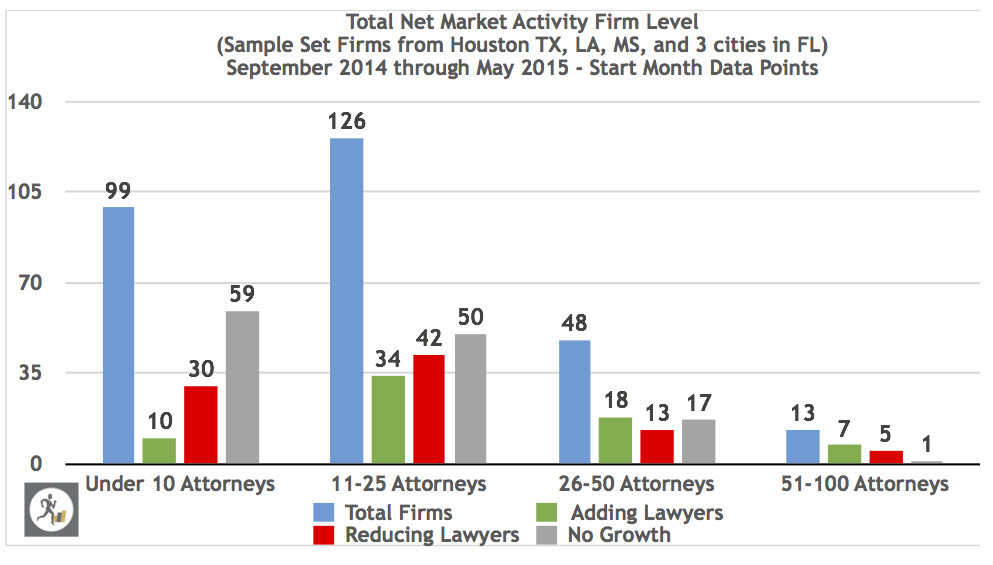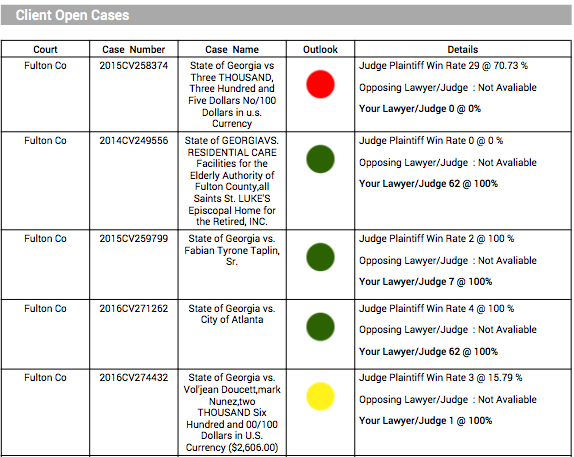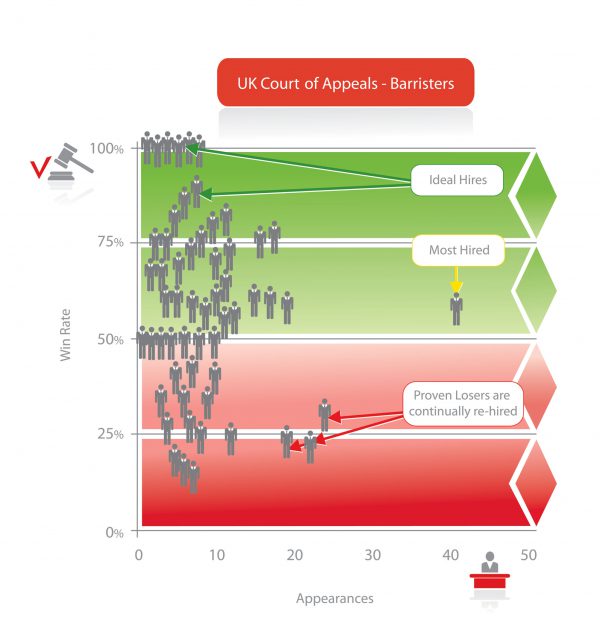
Miami, Florida, May 20, 2015 (Newswire) –Since last September we have been tracking attorney counts in 286 firms and 4 markets that include Houston Texas, all of the major Louisiana Markets, Jackson MS, and 3 Florida markets. The following data are relevant.
“Technologies exist and are being developed to better prepare lawyers for trial and to manage results without the need for a trial. One such firm developing these capabilities is Premonition LLC, who is building an offering based on analytic concepts to form predictive conclusions.”
In total, 75% of these firms either indicated no growth or reductions in lawyer counts, while only 24% indicated growth in lawyer count. Not all segments, as defined by firm size, in this market grouping are performing the same. For example, the firms in the 26-50 and 51-100 groups actually had more firms adding lawyers than reducing lawyers. Alternatively, the under 10 grouping of firms has 3 firms reducing lawyers for every firm adding lawyers.
I should point out that the total lawyers in these 26-50 and 51-100 attorney groups only increased by 2. We do not track individual lawyer movements between firms or average firm age demographics in our sample set, but much of the adding and reducing is likely related to competitive takeaways and lateral activity. More simply, some firms are likely just doing a better job marketing or otherwise running their firms than their less focused competitors.
Is it a bad market or is it simply becoming more efficient?
All too often firms put themselves in a holding pattern when they perceive that they are in a tight market. Preferring instead to wait for “things” to turn around. When firms fall into this “sitting duck” mindset, a process of decline begins. Characteristics of declining firms include:
- An aging attorney demographic;
- A lack of peer competition to perform; and
- A continual process of adjusting life styles related to less income.
Client growth is nonexistent and opportunities for upward mobility decrease. Ambitious and motivated attorneys will not stay in these types of firms very long. And there are more than a few firms in our sample set potentially trending into this category. The graphic above indicates that 127 (44%) of the 286 total firms have been in a holding pattern since September 2014. Declining firms are not mentioned simply because they are not likely able to add new lawyers in their present state.
An educated guess may be that many of these firms are waiting for a general improvement in market conditions or even their particular economic performance before prospectively hiring again. No one can know the future, but it is my opinion that “things” are not going to turn around in the traditional sense. Essentially, I believe that the market is rapidly becoming more efficient and slow reacting firms are in the process of being left behind.
Complacency = “new normal”
Compounding these effects is that many firms have traded their confidence and high expectations for acceptance and lowered expectations. Terms such as “new normal” become and explanation and justification for poor performance.
Some of the more common excuses I hear for a lack of growth include:
- Clients won’t pay for training;
- Clients do not want to try cases any longer;
- Clients only want senior lawyers working on their matters;
- My firm does not incent me to use associates; and
- If I give work to others I won’t have anything to do etc.
Evolving firms, new technologies
I could go on, but really what is missing from this conversation is a strategy for profiting in this environment. At some point, value and price will meet equilibrium. As clients build up their in-house capability and continue to improve technology to manage their outside legal spend, the core competency of the private law firm market must evolve.
For example, technologies exist and are being developed to better prepare lawyers for trial and to manage results without the need for a trial. As these technologies continue to improve, it is likely that they will become a surrogate for the competitive advantage formerly provided by a seasoned trial lawyer.
One such firm developing these capabilities is Premonition LLC (www.Premonition.ai ), who is building an offering based on analytic concepts to form predictive conclusions. Premonition advertises that they are able to analyze win loss data for particular firms or lawyers in particular jurisdictions and in front of particular judges. These data would allow for a more informed selection of outside counsel or a better assessment of a likely outcome of a matter being considered for trial.
Whether one accepts the accuracy of this science today or not, these big data analytics are assuredly going to be a part of the legal process. The impacts on the practice of law at the everyday level may be profound. It is our experience that many firms are ill prepared for disruptive technological shifts in their everyday professional lives.
To meet these challenges, lawyers will have to raise their overall level of technical competence and their ability to understand statistics and probabilities. Almost every aspect of managing a firm must be modernized with the understanding that many of the attainable advantages will be technological. From simple adoption (learning how to use available technology better than anyone else) to actual innovation, law firms must either adapt to technological advances or be left behind.
Calling all bright minds
Regardless of how the practice of law changes in the future, law firms will always need energy, experience, skill and wisdom. Forward thinking law firms realize that hiring bright young lawyers is a critical component of ensuring that the firm does not run out of energy and fall into decline.
The best lawyers realize that they are better when they surround themselves with talented, motivated, energetic and curious young minds. Furthermore, these young minds will be strong resources for handling the rapidly evolving technologies involved in the practice of law.
With every new hire should come great expectations and the opportunity to change the dynamic of a firm’s offering. Clients are not saying don’t hire young people, but they are saying that they won’t pay for them until real value is added. Smart firms will adjust their strategic plan and cost structure to allow for the inclusion of bright new minds.
written by: Brian Kennel, CEO PerformLaw “Law firm performance improvement experts”









